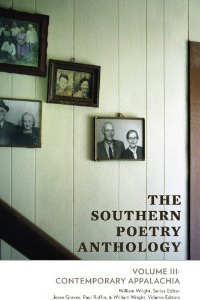


Foreword to
The Southern Poetry Anthology
Volume III: Contemporary Appalachia
In an interview I conducted several years ago with Jesse Graves, my friend and a co-editor for this volume, I asked whether he felt his poems, and the poems of his Appalachian forebears and contemporaries, were in an unspoken aesthetic war with recent "disjunctive" and "compositional" poets, the likes of John Ashbery and Jorie Graham. I should have expected Jesse's rare mixture of openheartedness and acuity:
"I tend to have a big-tent, utilitarian view of poetry, in that there ought to be room for as many approaches as poets are inclined toward. Obviously, I don't value them all equally, and though I might prefer the emotional openness and authenticity of Jane Hirschfield, I can still appreciate the sardonic wit of Charles Simic, or the crystalline economy of Michael Palmer. . . but a commitment to the poem of Meaningless Meanings seems as limiting to me as committing to writing nothing but straight English sonnets from here on out."
Jesse goes on to say that, conversely, when poems become transparently prosaic, stories without sculpture or syntactical risks, they "suffer" and "give away too much of their mystery, a problem with lots of narrative poetry. The best narrative poets . . . are still writing with lyric concision and an openness that permits surprise and mystery into their work, and their poems feel neither boxed-in nor mundane. . . ."
The poems in this volume of contemporary Appalachian poetry are clear-eyed renderings of the Appalachian South and its many narratives, yet their mystery is undeniably present, nestled just beneath the images, a life-blood humming the words to life. On a general level, this pulse in the poems derives from their largely shared tendency to engage with the grand motifs: Time with a capital T, the natural world, family, history, identity, love, and death. Sound reinforces this mystery, the poems' rhythms mostly sculpted from the Anglo-Saxon, adopting the aural essences of the actions they describe: Michael Chitwood's hatchet "chops" and with the "blunt side" "knocks," while Thorpe Moeckel's narrator tells us that to follow Bartram's trail "is to crawl, is to hopscotch / between the doghobble and the yellowroot." Yet even the longer, less onomatopoetic Greek and Latinate words brim with sonic lushness, as with Lynn Powell's "glossolalia" and "delphinium," words that embroider vividly into "Fragments of a Lost Gospel" and "Kind of Blue." Whatever the etymologies of their words, the poems in this volume flare bright and gemlike, shimmering and chiseled like sapphires among lesser stones. All the while, they preserve their mysteries in the best ways, like Joseph Cornell shadowboxes, and in their vibrancy balance sound and sense admirably–often, as Richard Wilbur has written, "blurring to sheer verb."
Most of all, the poems of this collection ring true. I first discovered some of these poets in my early teens, when I decided to write seriously. Because of this exposure, I became aware blessedly early that poems were not necessarily puzzles to decode: Instead, they could be radiant songs. Thus, I feel most indebted to the poets of the Appalachian South. As a southerner but not an Appalachian, I still feel drawn north to the highlands from my native piedmont South Carolina, haunted by these old words and ways-walking by creeks flanked in galax and rhododendron. I want to stay here, deep in this timeless, vital music.

